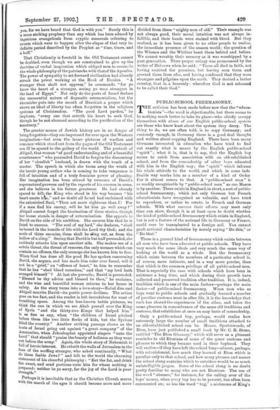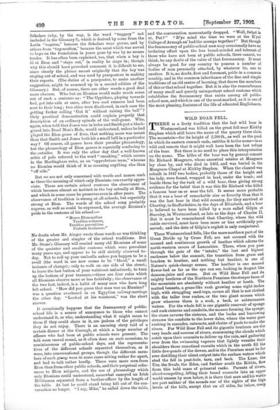PUBLIC-SCHOOL FREEMASONRY.
THE criticism has been made before now that the "educa- tionists "—the word is objectionable, but there seems to be nothing much better to take its place—who chiefly occupy themselves with abuse of our English public-school system are those who know least about the system they decry. The thing to do, we are often told, is to copy Germany; and curiously enough, in Germany there is a good deal thought and written about copying England. There have been many Germans interested in education who have tried to find out exactly what is meant by the English public-school " spirit " ; what it is, that is to say, that the English boy seems to catch from association with an old-established school, and from the comradeship of other boys educated with him in the English way; the " spirit " which informs his whole attitude to the world, and which in some hide finable way marks him as a member of a kind of Order For it almost comes to that. A "public-school man" is as readily recognisable by " public-school men " as one Mason is by another. There exists in England, in short, a sort of public- school freemasonry ; which not only German but French educationists have recognised as valuable, and have tried to reproduce, or rather to create, in French and German schools. With what success their efforts may meet only time can show, though it is at least open to doubt whether the kind of public-school freemasonry which exists in England, but is not a feature of the national life in Germany or France, could ever be transplanted to a foreign soil. You cannot graft national characteristics by merely saying "Do thin," or " Do that."
There is a general kind of freemasonry which exists between all men who have been educated at public schools. They have very much the same ideals and very much the same. way of looking at the world as a whole. But the freemasonry which exists between the members of a particular school is, of course, more intimate, and in a way more precise, than that which is the common privilege of all public-school men, That is especially the case with schools which have been in existence a long time, and which during their growth have collected and preserved tradition after tradition. It is, indeed, tradition which is one of the main factors—perhaps the main factor—of public-school freemasonry. When men who as boys went to public schools and gradually learned a number of peculiar customs meet in after life, it is the knowledge that each has shared the experiences of the other, and takes the same pleasure in remembrance of the same old traditions and customs, that establishes at once an easy basis of comradeship.
Only a public-school boy, perhaps, would realise how extremely large the number of small traditions attached to an old-established school can be. Messrs. Spottiswoode, of Eton, have just published a small book by Mr. C. R. Stone, entitled "The Eton Glossary," which will serve as a pleasant reminder to old Etonians of some of the queer customs and phrases to which they became used in their boyhood. They will realise—if they have left the school long—almost, perhaps, with astonishment, how much they learned at Eton which is peculiar only to that school, and how many phrases and names the school slang contains which to outsiders would be so much unintelligible jargon. Some of the school slang is no doubt pretty familiar to many who are not Etonians. The use of the word " absence," for instance, for the calling over of the boys' names, when every boy has to be present, has often been commented on ; so has the word " tug," a nickname of King's Scholars (why, by the way, is the word " tuggery " not included in the Glossary ?), which is derived by some from the Latin " togatus," because the Scholars wear gowns, and by others from "tug-mutton," because the meat which was served to boys on the foundation in years gone by was by no means tender. It has often been explained, too, that when a boy is ill at Eton and " stays out," in reality he stays in; though why this should have provoked comment it is difficult to see, since clearly the phrase meant originally that the boy was staying out of school, and was used by praepostors in making their reports. (The duties of a praepostor, to make another suggestion, might be summed up in a second edition of the Glossary.) But, of course, there are other words a good deal more obscure. Who but an Etonian would make much sense out of such a sentence as : " The Oppidans, playing towards bad, got into calx at once, after two cool runners had been sent to their long; two shies were disallowed, in each case the getting furker calling Got it' without raising the ball" ?
Only practical demonstration could explain properly that description of an ordinary episode of the wall-game. Who, again, when told that Jones was in holes and Smith put a black- guard into Dead Man's Hole, would understand, unless he had played the Eton game of fives, that nothing more was meant than that Smith and Jones both hit a small ball in a particular way P Of course, all games have their peculiar phraseology, but the phraseology of Eton games is especially confusing to the outsider. It was only the other day that a well-known critic of polo referred to the word " sneaking," which occurs in the Hurlingham rules, as an "opprobrious term," whereas no Etonian would think of it as meaning anything else than " off side."
But we are not only concerned with words and names such as these the meaning of which only Etonians can exactly appre- ciate. There are certain school customs the observance of which becomes almost an instinct in the boy actually at Eton, and which in some cases he preserves even in after years. The observance of tradition is strong at all schools, but especially strong at Eton. The words of the school song probably express, as well as could be expressed, the average Etonian's pride in the customs of his school :—
" Mores Etonensibus Traditos colamus, Traditos parentibus Posteris tradamus."
No doubt when Mr. Ainger wrote those words ne was thinking of the greater and simpler of the school traditions. But Mr. Stone's Glossary will remind many old Etonians of some of the quainter and smaller customs which were prevalent many years ago, and appear to be still strictly observed to- day. Not to roll up your umbrella unless you happen to be a swell (the word in use now seems to be " blood," a small instance of change) ; only to walk on one side of the street; to leave the last button of your waistcoat unfastened; to turn up the bottom of your trousers,—these are four rules which all Etonians observe more or less faithfully; the observance of the two last, indeed, is a habit of many men who have long left schooL "How did you guess that man was an Etonian?" was a question overheard in an Egyptian railway-carriage the other day. "Looked at his waistcoat," was the short answer.
It occasionally happens that the freemasonry of public- school life is a source of annoyance to those who cannot understand it, or who, understanding what it might mean to them if they could share in it, are jealous of the privileges they do not enjoy. There is an amusing story told of a certain dinner at the Curragh, at which a large number of officers who had been at public schools were present. The talk soon veered round, as it often does on such occasions, to reminiscences of public-school days, and the representa- tives of the different schools separated themselves, as it were, into conversational groups, though the different mem- bers of each group were in some cases sitting rather far apart, and had to talk rather loudly. There were more men from Eton than from other public schools, and their perpetual refer- ences to Eton subjects, and the use of phraseology which only Etonians could understand, somewhat annoyed an Irish Militiaman separated from a brother-officer by the length of the table. At last he could stand being left out of the con- versation no longer. "I say, Mike," he called down the table,
and the conversation momentarily dropped. " Well, fwha,t is ut, Pat F" " D'ye mind the time we were at the R'yal College of Armagh an' had the mumps together P" But though the freemasonry of public-school men may occasionally have an irritating effect upon the less broad-minded and tolerant of those who have not been at public schools, there cannot, we think, be any doubt of the value of that freemasonry. It must always be good for any country to possess a number of bodies of men personally attached, by whatever tie, one to another. It is, no doubt, first and foremost, pride in a common sonship, and in the common inheritance of the fine and simple traditions of an old centre of learning, that draws the members of this or that school together. But it is also the remembrance of many small and queerly unimportant school customs which establishes the freemasonry that exists among all public- school men, and which is one of the most marked, as it is one of the most pleasing, features of the life of educated Englishmen.











































 Previous page
Previous page